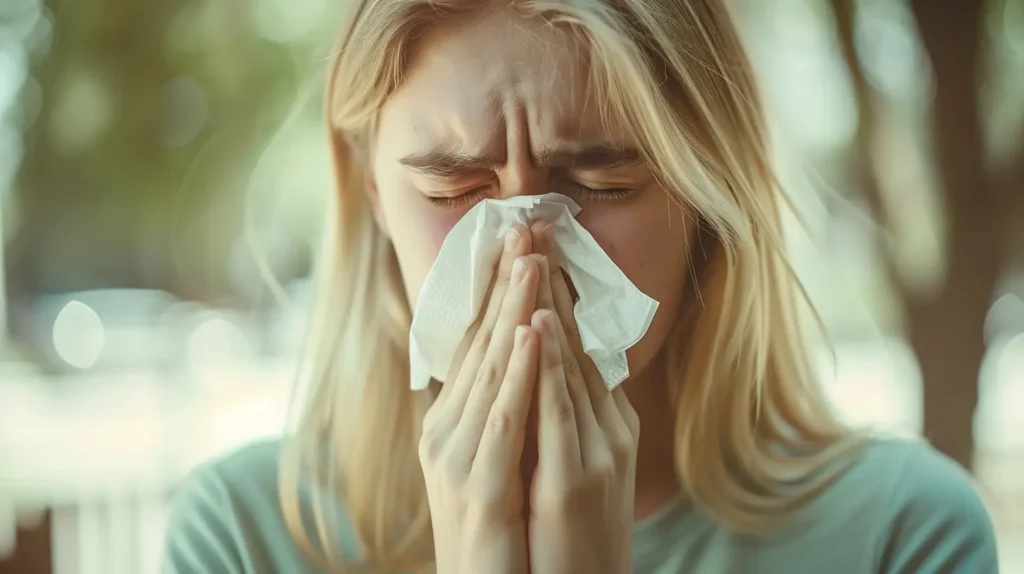Imagine your body as a finely tuned orchestra. During pregnancy, it’s as if the conductor has changed, and every instrument is playing a slightly different tune. Hormones are surging, your immune system is adapting, and everything feels a bit out of sync. Now, picture giving birth and expecting the orchestra to return to its original harmony, only to find that some instruments are still playing those new, unexpected notes. This is what many new mothers experience with postpartum allergies.
Postpartum allergies can be a surprising and frustrating part of the post-birth journey. Just when you think you’ve navigated the challenges of pregnancy and childbirth, you might find yourself sneezing, itching, or dealing with unexpected food sensitivities. These allergies can affect not only your comfort but also your overall well-being during a time when you need to be at your best.
In this article, we’ll talk about postpartum allergies. We’ll find out why they happen, the common types, and how you can manage them effectively. Whether you’re a new mom or preparing for the postpartum period, understanding these allergies can help you navigate this phase with confidence and ease.
What are Postpartum Allergies?

Postpartum allergies are allergic reactions that occur in women after giving birth. These allergies can be new or existing conditions that worsen following pregnancy. They typically manifest as skin reactions, respiratory issues, or food sensitivities.
During pregnancy, a woman’s immune system undergoes significant changes to protect both the mother and the developing fetus. The body carefully balances between suppressing and enhancing different aspects of the immune system. This delicate balance can sometimes lead to unexpected allergic responses after childbirth.
The immune system changes during pregnancy are precisely timed:
- First trimester: The body becomes more pro-inflammatory to allow embryo implantation
- Second trimester: Anti-inflammatory responses increase to support fetal growth
- Third trimester: Pro-inflammatory responses return to prepare for labor
After delivery, the immune system begins to reset itself. This reset process can sometimes trigger allergic reactions. Factors that may contribute to postpartum allergies include:
- Hormonal fluctuations
- Stress and lack of sleep
- Exposure to new allergens (e.g., baby products)
- Changes in diet or medication
One common form of postpartum allergies is postpartum hives, also known as PUPPP (pruritic urticarial papules and plaques of pregnancy). These itchy, red bumps can appear on the skin and may be triggered by hormonal changes or stress.
Read More Here: Postpartum Hives: What Every New Mother Should Be Aware Of
It’s important to note that while postpartum allergies can be uncomfortable, they are generally temporary and manageable with proper care and treatment. If you experience persistent or severe allergic symptoms after giving birth, consult your healthcare provider for guidance and appropriate treatment options.
What are the Common Types of Postpartum Allergies?

After giving birth, many women experience various types of allergies that they may not have had before. Here are some of the most common postpartum allergies:
Seasonal Allergies: Many new moms report an increase in hay fever symptoms after pregnancy. This can include sneezing, runny nose, and itchy eyes when exposed to pollen, dust, or other airborne allergens.
Food Allergies and Sensitivities: Some women develop new food allergies or sensitivities after childbirth. Common culprits include dairy products, eggs, nuts, and wheat. These can cause symptoms like digestive issues, skin rashes, or even more severe reactions.
PUPPP Rash: Pruritic Urticarial Papules and Plaques of Pregnancy (PUPPP) is a skin condition that can persist after delivery. It appears as itchy, red bumps on the abdomen and can spread to other parts of the body.
Skin Allergies: Postpartum hives are another common issue. These itchy, raised welts can appear anywhere on the body and may be triggered by various factors including stress, hormonal changes, or exposure to new allergens.
Drug Allergies: Some women may develop allergies to medications they previously tolerated well. This can include over-the-counter pain relievers or antibiotics.
Here’s a quick reference table of common postpartum allergies and their symptoms:
| Allergy Type | Common Symptoms |
|---|---|
| Seasonal | Sneezing, runny nose, itchy eyes |
| Food | Digestive issues, skin rashes, anaphylaxis (severe cases) |
| PUPPP Rash | Itchy red bumps on abdomen |
| Skin (Hives) | Itchy raised welts anywhere on body |
| Drug | Rash, swelling, difficulty breathing (severe cases) |
It’s important to note that while these allergies can be uncomfortable, they are usually temporary and manageable with proper care and treatment. If you experience any new or worsening allergy symptoms after giving birth, consult your healthcare provider for guidance.
What are the Postpartum Allergies Symptoms?

Postpartum allergies can manifest in various ways, affecting different parts of the body. Here are some common symptoms to watch out for:
Skin Reactions:
- Hives: Itchy, raised bumps on the skin that can appear anywhere on the body
- Rashes: Red, inflamed patches of skin
- Eczema: Dry, itchy, and scaly skin patches
Respiratory Symptoms:
- Sneezing
- Runny or stuffy nose
- Coughing
- Wheezing or shortness of breath
Eye Symptoms:
- Itchy eyes
- Watery eyes
- Red or swollen eyes
Gastrointestinal Issues:
- Nausea
- Vomiting
- Diarrhea
- Stomach cramps
Other Symptoms:
- Fatigue
- Headaches
- Swelling of the face, lips, tongue, or throat
It’s important to note that symptoms can vary in severity from mild to severe. In some cases, postpartum allergies may trigger a serious allergic reaction called anaphylaxis, which requires immediate medical attention.
Here’s a quick reference table of postpartum allergy symptoms:
| Body System | Common Symptoms |
|---|---|
| Skin | Hives, rashes, eczema |
| Respiratory | Sneezing, coughing, wheezing |
| Eyes | Itching, watering, redness |
| Gastrointestinal | Nausea, vomiting, diarrhea |
| General | Fatigue, headaches, swelling |
If you experience any of these symptoms, especially if they’re new or worsening after childbirth, it’s important to consult with your healthcare provider. They can help determine if you’re dealing with postpartum allergies and recommend appropriate treatment options.
What causes Postpartum Allergies?
Postpartum allergies can be triggered by various factors, often related to the significant changes a woman’s body undergoes during and after pregnancy. Key causes and risk factors include:
Hormonal Changes: The rapid shift in hormone levels after childbirth can affect the immune system’s response.
Immune System Fluctuations: Pregnancy alters the immune system, which may lead to new sensitivities postpartum.
Environmental Factors: Exposure to new allergens, such as baby products or changes in diet.
Stress and Fatigue: Common in new mothers, these can weaken the immune system.
Genetic Predisposition: A family history of allergies may increase risk.
Previous Allergies: Women with existing allergies may experience worsened symptoms.
Cesarean Delivery: Some studies suggest a higher risk of allergies in mothers who undergo C-sections.
Understanding these factors can help new mothers and healthcare providers better manage and prevent postpartum allergies.
What are the Postpartum Allergies Treatment Options?

Treating postpartum allergies involves a combination of medical interventions and lifestyle changes. It’s important to consult with your healthcare provider before starting any treatment, especially if you’re breastfeeding.
Medications:
- Antihistamines: Non-drowsy options like loratadine (Claritin) and cetirizine (Zyrtec) are generally considered safe for breastfeeding mothers.
- Nasal Sprays: Corticosteroid nasal sprays such as fluticasone (Flonase) can help reduce nasal inflammation.
- Eye Drops: Antihistamine eye drops can relieve itchy, watery eyes.
Natural Remedies:
- Saline Nasal Rinse: Helps flush out allergens and reduce congestion.
- Humidifier: Keeps air moist, which can ease nasal passages.
- Acupuncture: Some women find relief through this traditional Chinese practice.
Lifestyle Changes:
- Allergen Avoidance: Identify and minimize exposure to your triggers.
- Diet Modifications: Eliminate foods that may be causing allergic reactions.
- Stress Management: Practice relaxation techniques like deep breathing or yoga.
Here’s a quick reference table for treatment options:
| Treatment Type | Examples | Notes |
|---|---|---|
| Medications | Antihistamines, nasal sprays | Consult doctor if breastfeeding |
| Natural Remedies | Saline rinse, humidifier | Generally safe for all |
| Lifestyle Changes | Allergen avoidance, stress management | Long-term benefits |
Remember, what works best can vary from person to person. Your healthcare provider can help create a personalized treatment plan that’s safe and effective for your specific situation.
Managing Postpartum Allergies While Breastfeeding

Dealing with allergies while breastfeeding can be challenging, but there are safe options available. Here’s how you can manage your symptoms without compromising your baby’s health or your milk supply:
Safe Medications:
- Non-sedating antihistamines like loratadine (Clarityn) and cetirizine (Zirtek) are considered safe for breastfeeding mothers.
- Nasal sprays containing corticosteroids such as fluticasone (Flonase) can help reduce nasal inflammation with minimal systemic absorption.
- Eye drops with antihistamines or sodium cromoglycate are safe for treating itchy, watery eyes.
Timing Your Medication:
Take your allergy medication right after breastfeeding. This allows time for the drug levels in your bloodstream to decrease before the next feeding.
Natural Remedies:
- Use a saline nasal rinse to flush out allergens and reduce congestion.
- Try a humidifier to keep the air moist and ease nasal passages.
Lifestyle Adjustments:
- Identify and avoid triggers when possible.
- Wear a mask when outdoors during high pollen days.
- Shower and change clothes after being outside to remove allergens.
Cautions:
- Avoid combination drugs that include decongestants like pseudoephedrine, as they may decrease milk supply.
- Be wary of sedating antihistamines, which can cause drowsiness in both you and your baby.
Remember to consult with your healthcare provider before starting any new medication while breastfeeding. They can help create a personalized treatment plan that’s safe for both you and your baby.
Natural Remedies and Prevention Strategies
While medical treatments are often necessary for managing postpartum allergies, there are several natural remedies and prevention strategies that can help alleviate symptoms and reduce the likelihood of allergic reactions.
Home Remedies:
- Nasal irrigation: Use a neti pot with saline solution to flush out allergens and clear nasal passages.
- Herbal supplements: Some women find relief with butterbur or stinging nettle, but consult your doctor before use, especially if breastfeeding.
- Probiotics: These may help boost your immune system and reduce allergy symptoms.
Natural Treatments:
- Acupuncture: Some studies suggest acupuncture may help reduce allergy symptoms.
- Essential oils: Peppermint, eucalyptus, or lavender oils may provide relief when used in a diffuser.
- Apple cider vinegar: Mix a tablespoon in water and drink daily to potentially reduce inflammation.
Prevention Strategies:
- Identify and avoid triggers: Keep a diary to track potential allergens and minimize exposure.
- Maintain a healthy lifestyle: Regular exercise, a balanced diet, and adequate sleep can boost your immune system.
- Reduce stress: Practice relaxation techniques like yoga or meditation to manage stress, which can exacerbate allergies.
Here’s a quick reference table for natural remedies and prevention strategies:
| Category | Examples |
|---|---|
| Home Remedies | Nasal irrigation, herbal supplements, probiotics |
| Natural Treatments | Acupuncture, essential oils, apple cider vinegar |
| Prevention Strategies | Identify triggers, healthy lifestyle, stress reduction |
Remember, while these natural approaches can be helpful, they should complement, not replace, medical advice. Always consult with your healthcare provider before trying new treatments, especially if you’re breastfeeding.
By combining these natural remedies with prevention strategies, you can create a comprehensive approach to managing your postpartum allergies and improving your overall well-being during this important time in your life.
Take Action: Prioritize Your Postpartum Health

While postpartum allergies are often manageable at home, there are times when you should seek medical attention. Be alert for these warning signs:
- Severe symptoms that significantly impact your daily life
- Allergic reactions affecting your breathing
- Hives or rashes that persist for more than a few days
- Any symptoms causing distress to you or your baby
Remember, your health is crucial not only for you but also for your newborn. Don’t hesitate to reach out to your healthcare provider if you’re unsure about your symptoms.
Postpartum allergies, though challenging, are a manageable aspect of the post-birth journey. By understanding their causes, recognizing symptoms, and knowing how to manage them, you can navigate this phase more comfortably. Remember that every woman’s experience is unique, and what works for one may not work for another.
Your next steps:
- Stay informed about potential triggers
- Prepare a self-care kit with safe, doctor-approved remedies
- Maintain open communication with your healthcare provider
By taking these proactive steps, you’re not just managing your allergies – you’re prioritizing your overall postpartum well-being. Your journey into motherhood deserves all the support and care you can give yourself. Don’t let postpartum allergies hold you back from enjoying this special time with your new baby.
Today we talked about the Postpartum Allergies. Here are some other articles you might be interested in:
Best Postpartum Collagen for Recovery
What is a Postpartum Pain Relief Spray?
Belly Tightening Cream: Does it really work?
Postpartum Migraine and How to Relief it
How to deal with Postpartum Hemorrhoids



